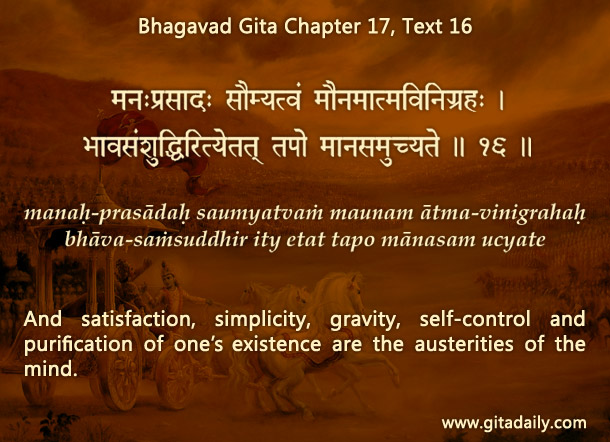Many virtues, like gratitude, are difficult to cultivate and easy to lose. One counterintuitive way we may lose gratitude is by our overzealousness in insisting others to cultivate gratitude — especially if we expect them to be grateful to us.
For example, if we are parents, we may naturally expect them to be grateful for all that was done for them during their upbringing. And while having such expectations, our intentions might be good: we may not want them to pander to our ego; we may want them to learn the virtue of gratitude from us — and the good things that we have done for them might just be the means to instill gratitude in them. Nonetheless, whatever be our motive, if we find that they aren’t grateful, we may feel resentful. And that resentment may blind us toward various good things in our life, including the good things that we passed on to our loved ones.
How can we feel grateful even when we don’t get any reciprocal gratitude? Gita wisdom provides us two empowering insights. One, the good things in our life are not ours to claim credit for — they come by divine grace (07.08). Even if we worked hard to arrange them, those things wouldn’t have been ours to pass on if divine grace hadn’t manifested in our lives. It was God who gifted those things to us and enabled us to pass those gifts on to our loved ones. Two, the opportunity to pass those gifts to others is itself a gift (18.68-69). Further, the Gita encourages us to work in a mood of selfless service without being attached to fruits — fruits that include expecting others to be grateful to us for what we have done for them. By drawing on such insights, we can hold on to gratitude by cultivating it as an austerity of the mind, independent of others’ reciprocation or non-reciprocation (17.16).
Summary:
Gratitude demanded is gratitude diminished — the more we insist that others be grateful to us for the things we give them, the more we undercut our own capacity to appreciate that those things were gifts given to us.
Think it over:
- Why might we expect gratitude from others?
- How may expecting gratitude from others diminish our own capacity for gratitude?
- How can Gita wisdom help us cultivate gratitude even in the absence of reciprocal gratitude?
Audio explanation of the article is here: https://gitadaily.substack.com/p/gratitude-demanded-is-gratitude-diminished
***
17.16: And satisfaction, simplicity, gravity, self-control and purification of one’s existence are the austerities of the mind.
To know more about this verse, please click on the image


Leave A Comment